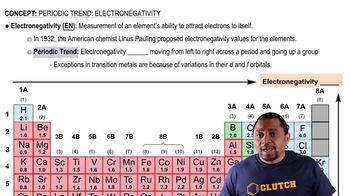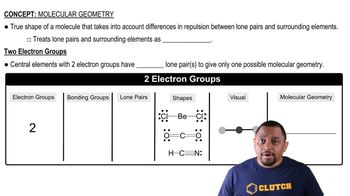Textbook Question
(b) It turns out that ozone, O3, has a small dipole moment. How is this possible, given that all the atoms are the same?
1662
views
 Verified step by step guidance
Verified step by step guidance



(b) It turns out that ozone, O3, has a small dipole moment. How is this possible, given that all the atoms are the same?
(c) Does the molecule BF2Cl have a dipole moment?
(a) Consider the following two molecules: PCl3 and BCl3. Which molecule has a nonzero dipole moment?
Predict whether each of the following molecules is polar or nonpolar: (a) CCl4, (b) NH3, (c) SF4, (d) XeF4, (e) CH3Br, (f) GaH3.
Dichloroethylene (C2H2Cl2) has three forms (isomers), each of which is a different substance. (b) Which of these isomers has a zero dipole moment?
Dichloroethylene (C2H2Cl2) has three forms (isomers), each of which is a different substance. (c) How many isomeric forms can chloroethylene, C2H3Cl, have? Would they be expected to have dipole moments?